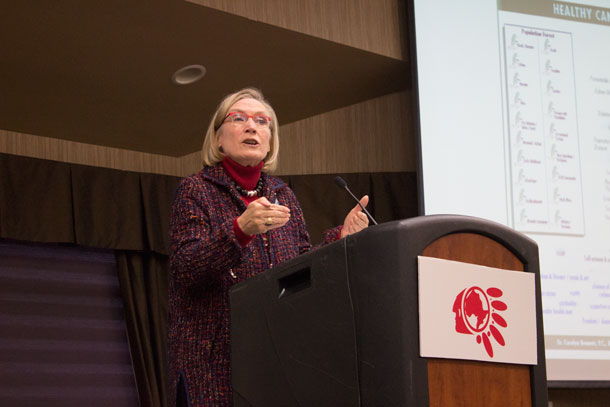VANCOUVER – The Union of British Columbia Indian Chiefs have sent an open letter to federal Minister Carolyn Bennett over the decision by the United Nations Human Rights Committee over discrimination against Indigenous women under the Indian Act.
The Chiefs write, “The focus of the Canadian government should not be on determining whether inequities should be allowed to persist (as seems to be the purpose of the survey), but on eradicating the discrimination of the Indian Act that continues to alienate and exclude Indigenous women and their descendants. Canada must not prescribe prejudiced approaches to addressing the legislated sexual discrimination against Indigenous women and their descendants”.
Text of Open Letter
OPEN LETTER: Recall the Collaborative Process survey and honour the UN ruling on the Indian Act’s discrimination against women
Dear Minister Bennett,
The UN Human Rights Committee’s landmark decision on the Sharon McIvor case has called for a tide of progressive change regarding the discrimination enshrined in the Indian Act.
The Committee has ruled that Canada must take immediate action regarding the legislated sex discrimination that has prohibited women like Sharon McIvor from accessing the same rights to Indian status that are afforded to men. In light of the Committee’s decision, the Union of BC Indian Chiefs (UBCIC) urges you to immediately abandon the survey the Department of Crown-Indigenous Relations and Northern Affairs has launched as part of the Collaborative Process on Indian registration, band membership, and First Nation citizenship.
The CIRNA’s survey is fundamentally flawed and unrepresentative of the true collaboration that needs to take place between Indigenous Peoples and the Government of Canada. Designed by the government as a nominal and placatory symbol of “reconciliation” and “renewed relationships,” the survey is anything but collaborative. Now that the UN Committee has ruled that Canada must dismantle the discriminatory, sex-based hierarchy in the status registration provisions of the Indian Act, the survey is unnecessary and insulting to the Indigenous women who continue to have their right to equality breached.
UBCIC would like to highlight the following integral flaws of the Collaborative Process survey that make its recall of paramount importance:
- Design flaws render the survey’s results highly dubious and imprecise. Anyone can take the survey, including non-Indigenous people, and there is no limit to how many times a participant can take the survey. The results may be skewed and entirely unreflective of the true sentiments of Indigenous people in Canada.
- Questions are present that normalize discrimination against Indigenous women. Stream 1 of the survey poses the question: “Do you think the removal of the “1951 cut-off” is a positive or negative thing for First Nations?” Questions such as these are problematically worded to sidestep the inherent discrimination of the Indian Act; they are fundamentally asking the participant whether the Canadian government should continue to discriminate against First Nations women and their descendants.
- Information regarding the complexity and scope of the enduring discrimination against Indigenous women is omitted. Question 1 in Stream 1 regarding the 1951 cut-off is framed in such a way that participants may not understand that it is referring to the removal of the sex-based inequities sanctioned by the Indian Act.
The UN Human Rights Committee has clearly communicated that discrimination against Indigenous peoples is unacceptable and must be stopped. The focus of the Canadian government should not be on determining whether inequities should be allowed to persist (as seems to be the purpose of the survey), but on eradicating the discrimination of the Indian Act that continues to alienate and exclude Indigenous women and their descendants. Canada must not prescribe prejudiced approaches to addressing the legislated sexual discrimination against Indigenous women and their descendants. Canada must immediately act to eliminate all instances of discrimination and inequities within Canadian legislation, policy and operational practices. It must engage directly with First Nations, as full partners, in developing the necessary next steps to provide First Nations with the essential resources and tools to recognize and welcome back excluded Indigenous women and their descendants into our communities. It is crucial for Canada to heal the wounds created by its artificially imposed divisions amongst Indigenous peoples.
The UN Declaration on the Rights of Indigenous, which Canada has endorsed without qualifications, states:
Article 8 (1): Indigenous peoples and individuals have the right not to be subjected to forced assimilation or destruction of their culture;
(2): States shall provide effective mechanisms for prevention of, and redress for:
- a) Any action which has the aim or effect of depriving them of their integrity as distinct peoples, or of their cultural values or ethnic identities;
- b) Any action which has the aim or effect of dispossessing them of their lands, territories or resources
- c) Any form of forced population transfer which has the aim or effect of violating or undermining any of their rights;
- d) Any form of forced assimilation or integration.
Canada must shift its attention away from a survey filled with hypocrisies, and instead devote its efforts and resources to implementing the UN Committee ruling made in response to Sharon McIvor’s petition. We urge you to commit to this cause and to help Canada acknowledge and rectify the discriminatory sections of the Indian Act. The goals of the Collaborative Process initiated by the Government of Canada – reconciliation and renewed nation-to-nation relationships with Indigenous Peoples – can never be sustained until all First Nations women and their descendants are granted status on the same footing as First Nations men and their descendants.
On behalf of the UNION OF BC INDIAN CHIEFS
Grand Chief Stewart Phillip
President
Chief Robert Chamberlin
Vice-President
Kukpi7 Judy Wilson
Secretary-Treasurer
CC: Sharon McIvor
National Chief Perry Bellegarde, Assembly of First Nations
First Nations Summit Task Group
Regional Chief Terry Teegee, BC Assembly of First Nations







